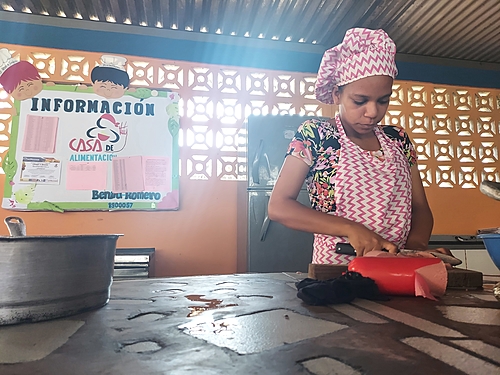
Cooking to face the economic crisis and organizing politically to face the blockade. This is how the Movement of Territorial Mothers defines its objectives in the small town of Cumanacoa, in the interior of Venezuela, 500 km from the capital Caracas. Made up mostly of women, the movement is responsible for directing the Food Houses social program, which aims to serve the vulnerable population of the region by offering daily meals.
Founded in 2004 by former president Hugo Chávez, the houses emerged as a public policy to serve low-income people. In 2016, however, given the economic difficulties brought about by the crisis, the government considered ending the program, but ended up handing it over to the Ministry of Communes, which meant, in practice, handing over command to popular movements.
In Cumanacoa, the experience made the Food Houses go beyond a public policy assistance function and also served to organize and politically train women in the region.
This Wednesday (7th) is World Food Safety Day. The date is set by the UN and serves to warn about the risks of hunger and malnutrition in different parts of the world. In recent years of economic crisis, Venezuela lost positions in the world ranking and today faces several social obstacles. In 2014, the country was even considered a model for combating hunger, after managing to make 98% of the population consume at least three meals a day. However, the impacts of the crisis aggravated by US sanctions against the country caused Venezuela to have the highest level of malnutrition in South America in 2022, according to FAO.
To the Brazil in factYolenny Velásquez, coordinator of the Territorial Mothers Movement, explains that the functions of the women responsible for the 20 Food Houses that exist in the municipality go beyond the kitchen.
::What’s happening in Venezuela::
“We are responsible not only for preparing the food, but also for organizing it, at the communal level, in the struggles of the people, in the grassroots organization. So, the movement was born inside the houses and, today, we are a movement of Territorial Mothers and Fathers, because we also have men on the team, totally feminists, dominated and controlled by this troop of women”, she says.
The women are divided into 12 committees, which serve as organizational nuclei in each of the municipality’s communities. They explain that their political activities involve, in the first place, rethinking the role of women in everyday life, whether at home or in the neighborhoods where they live.
“That’s why we named it ‘territorial’, because we are linked to our territory, our neighborhoods, our communities, we know everyone and everyone knows us and knows that they can count on us to face the daily problems brought about by the crisis”, explains Velásquez .
::After company default, peasants in Venezuela take over communal production::
Among the committees created by the movement are the productive economy, defense, training and even recreation committees, which are in charge of preparing events on festive dates. Of the total, 10 of them are coordinated by women and only two men occupy a post on the committee board.
The connection between the Movement of Territorial Mothers and Food Houses with other popular organizations is through the Committee of Communes and Social Movements, directed by Elismar Bravo.
Responsible for the Food House in the small town of La Manga, Bravo explains that currently, through an agreement with the city hall, they have earned a salary for all the women who are part of the project. In addition, she praises the female leadership of the movement and highlights the importance of the autonomy conquered by the region’s social leaders.
::Venezuela: In dispute with businessman, peasant movement denounces murder of leader::
“It has been excellent, because before we were discriminated against, we had to be housewives. Not now, most women are at the head of a CLAP [Comitê Local de Abastecimento e Produção]at the head of a city hall, that is, always occupying some social and political role”, he says.
Economic crisis and dependency
Since its inception in 2004, the basic function of the Food Houses has been to guarantee daily meals to the most vulnerable sectors of communities throughout Venezuela. The years of economic crisis, however, greatly affected the state’s investment capacity and the program was threatened with being interrupted.
On the other hand, the demand for projects like this one has increased, in view of the level of impoverishment the country has gone through. From 2014, the year in which the Venezuelan recession began, until 2020, it is estimated that the country has lost more than 75% of its GDP.
::Growing but threatened by inflation: what are Venezuela’s economic challenges in 2023::
The drop in the price of a barrel of oil immensely affected the state’s investment capacity and the sanctions imposed by the USA, which became worse from 2019, caused the country to enter a serious situation of hyperinflation that withdrew workers’ purchasing power and placed many people in a situation of social vulnerability.
“From 2016 it was very hard, there were years of crisis, blockade, imperialist attacks and if it weren’t for this project, we would be in worse conditions”, says Yolenny Velásquez.
According to the most recent data from the Strategic Food Program Foundation (Fundaproal), linked to the Ministry of Food, there are currently 3,943 homes in operation in all states of the country, serving more than 700,000 beneficiaries.
::Venezuela: community raises pigs and fish to feed 4,000 families in Caracas community::
The 20 Food Houses in Cumanacoa serve approximately 5,500 people a day. Currently, the project receives a quantity of food sent by the Ministry of Food and is in charge of other management tasks, such as planning, cooking and serving meals. In Cumanacoa, there is still a lot of dependence on state entities in relation to food, but the women want to change that.
“Around 70% of what we cook comes from the state and 30% is locally produced,” says Velásquez. The leadership of the movement, however, states that one of the objectives is to develop productive patios in each of the Food Houses so that the project can be increasingly autonomous and support local producers.
::Impact of the US blockade against Venezuela is more serious among women::
“We hope to be able to carry out a planting project on a large scale, so that with these harvests we can expand the diversity of the menus that we currently offer in homes”, he explains.
“We are overcoming the sanctions and the many difficulties that have appeared over the years. We are a resistant people. We are fighting this crisis situation with a lot of love and dedication, cooking every day for the benefit of our communities, to show our neighbors that there is a way, that there is still hope”, he says.
Editing: Thales Schmidt
Source: www.brasildefato.com.br

